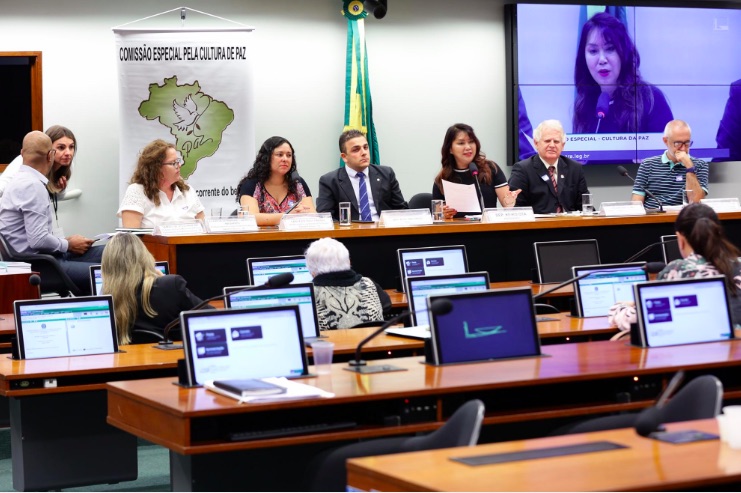… EDUCATION FOR PEACE …
An article from Agência Câmara Notícias (translation by CPNN)
In a public hearing on Wednesday, the 14th. experts called for public policies to train teachers to promote a culture of peace in schools, The debate was promoted by the special commission to draft legislative proposals to develop a culture of peace.

Committee chairwoman Keiko Ota (center) has called for tougher laws to curb violence, but acknowledges that it is necessary to think about prevention policies to teach children and young people how to cultivate peace in schools
The United Nations defines a culture of peace as a set of values, attitudes, traditions, behaviors and lifestyles based on respect for life, the end of violence and the promotion and practice of non-violence through education, dialogue and cooperation.
According to Nei Salles Filho, the coordinator of the Center for Studies and Training of Teachers in Education for Peace and Coexistence of the State University of Ponta Grossa (Paraná), the main step for the promotion of a culture of peace is teacher training. “This training involves knowledge of the areas of human values, human rights and mediation of conflicts,” he said. According to him, designing public policies in this sense is the best way to maintain continued projects of culture of peace in schools.
(Article continued in right column)
Where is peace education taking place?
(continued from left column)
The United Nations defines a culture of peace as a set of values, attitudes, traditions, behaviors and lifestyles based on respect for life, the end of violence and the promotion and practice of non-violence through education, dialogue and cooperation.
According to Nei Salles Filho, the coordinator of the Center for Studies and Training of Teachers in Education for Peace and Coexistence of the State University of Ponta Grossa (Paraná), the main step for the promotion of a culture of peace is teacher training. “This training involves knowledge of the areas of human values, human rights and mediation of conflicts,” he said. According to him, designing public policies in this sense is the best way to maintain continued projects of culture of peace in schools.
According to the specialist, teachers have to understand that student violence may be the result of direct violence (physical, psychological, sexual, media) or structural violence (poverty, misery). “If the student learns to reproduce the culture of violence, he can also learn a culture of peace,” he said. He also stressed that peace does not mean the absence of conflict, but a way of dealing with conflicts. In addition, he stressed that promoting the culture of peace in schools was included as a goal of the National Education Plan (2014-2024).
According to the specialist, teachers have to understand that student violence may be the result of direct violence (physical, psychological, sexual, media) or structural violence (poverty, misery). “If the student learns to reproduce the culture of violence, he can also learn a culture of peace,” he said. He also stressed that peace does not mean the absence of conflict, but a way of dealing with conflicts. In addition, he stressed that promoting the culture of peace in schools was included as a goal of the National Education Plan (2014-2024).
(Thank you to Helena Lorenzo, the CPNN reporter for this article.)